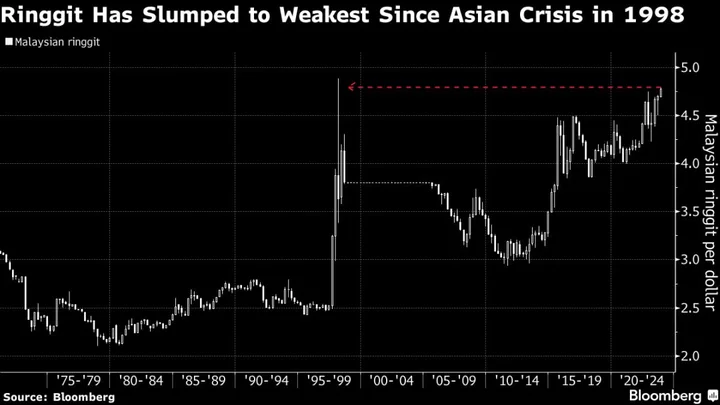Former Malaysian premier Mahathir Mohamad said the country should consider pegging its sinking currency to the dollar, repeating the policy he introduced during the Asian financial crisis in the late 1990s.
“It’s something to be considered,” Mahathir said in an interview on Wednesday in his office in the administrative capital of Putrajaya.
The ringgit is the worst performer in emerging Asia this year, sliding almost 8% versus the greenback. It slumped to almost 4.8 per dollar last month, the weakest level since January 1998, the height of the multi-year crisis that roiled Asian financial markets.
The currency may slide a further 5% to a record-low 5 per dollar, Mahathir, now 98, said in the interview. “Just imagine what that would mean to your cost of living,” he said, adding that pegging the currency would help to alleviate price pressures.
Malaysian assets have suffered this year as surging US interest rates have siphoned funds back to the world’s biggest economy. Bank Negara Malaysia has held its key rate at 3% since July, putting the gauge at a record discount to the upper bound of the Federal Reserve’s benchmark. At the same time, sputtering growth in China, Malaysia’s biggest trading partner, has weighed on its exports.
Malaysian policymakers remain committed to ensure the ringgit adjusts in an orderly manner, Bank Negara Malaysia Governor Abdul Rasheed Ghaffour said last week. “We have been in the markets, and we will, when needed, continue to be in the market,” he said.
The central bank didn’t respond to a request for comment about a potential ringgit peg on Wednesday.
‘Stability Anchor’
Malaysia’s currency tumbled during the Asian crisis, piling pressure on the country’s foreign-exchange reserves.
Mahathir, who first became prime minister in 1981, rejected a bailout by the International Monetary Fund. He instead introduced capital controls in September 1998 and then pegged the ringgit at 3.8 per dollar, a policy that stayed in place until 2005.
The IMF, which at the time called the ringgit peg a “retrograde step,” later acknowledged it was a “stability anchor” that helped the economy recover.
“Foreign investors were very happy,” Mahathir said in the interview.
Mahathir became prime minister for a second time in 2018 after leading a reformist coalition to victory at the general election that ended the six-decade rule of the party he once headed. But squabbling within the coalition, including over when he would step aside, helped bring the government down after only 21 months.
‘It’s Wrong’
Mahathir said he had floated the idea of re-pegging the ringgit to the central bank when he returned as premier.
“They said: ‘No, it cannot be done because it is wrong internationally, fixing the exchange rate is wrong,’” Mahathir said.
The elder statesman has a long history of disdain for currency traders and once called billionaire investor George Soros a “moron” for his bold bets against the ringgit in the run-up to the Asian crisis.
“We should outlaw currency trading,” he said in the interview. “You are making profit out of creating poverty for people.”
--With assistance from Anisah Shukry.
Author: Netty Ismail, Niluksi Koswanage and Tom Redmond

